Blog
Welcome to IESR Photo Gallery
This page features downloadable photos depicting IESR'environment, equipment, innovations and its people.
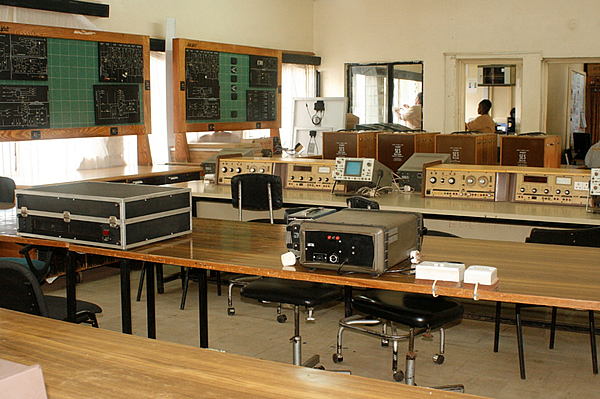
Figure 1: IESR Electronics Laboratory
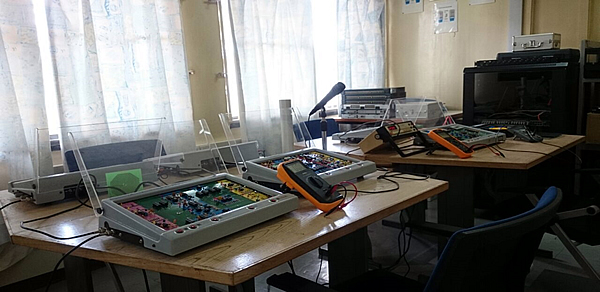
Figure 2:Telecommunication Laboratory
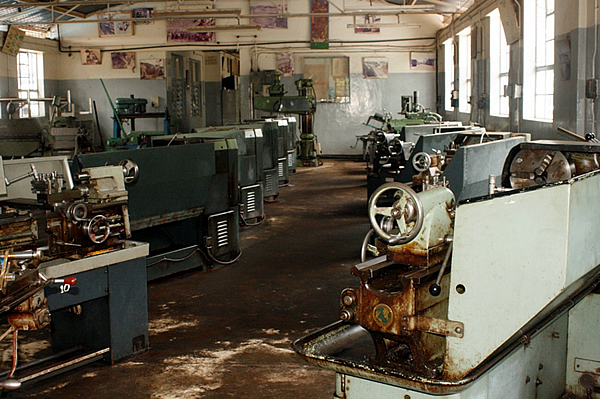
Figure 3:Mechanical Workshop
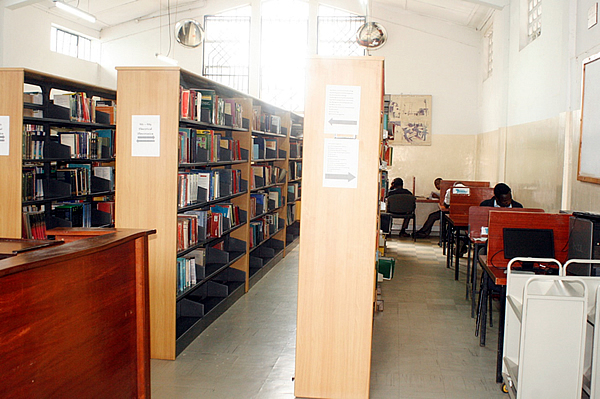
Figure 4:IESR Library
Fortinatah Mandi - Live line team leader with heart of fortitude
By Samuel Chege
Perched high up, she calmly gives instructions to her peers even as she, with the precision of a neurosurgeon, works on a live line.Background Information
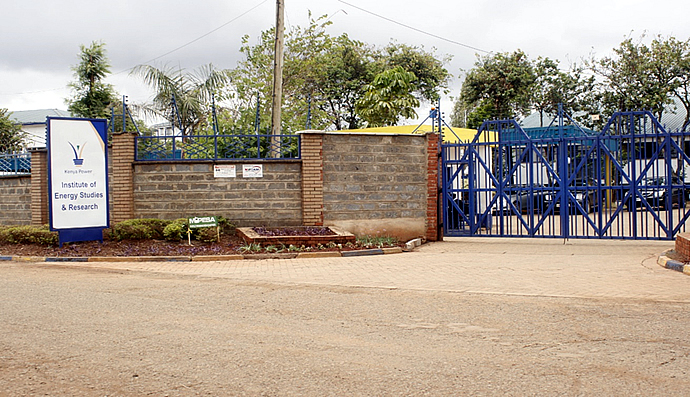
IESR Entrance and Main Gate
The Institute of Energy Studies and Research (IESR) was established in 1957 with the aim of developing technical and supervisory skills to the then East African Power and Lighting Company employees. Initially, training was concentrated in power line distribution and later on expanded to include electrical fitters, plant operators, motor vehicle mechanics electricians and electronic mechanics. To date, these courses are still conducted to meet the training needs of Kenya Power staff and other corporate organizations. Most employees in the Electrical Energy Sub Sector in Kenya were either trained or did their internship at this Institute.
In the year 2000 due to the growing demand, the Institute opened its doors to the public. Currently the Institute offers capacity building courses, artisan, craft and diploma programs. The Institute is in the process of engaging in active research and innovation that is beneficial to the energy sector and in view of this it has signed an MOU with JKUAT to support this initiative. The Institute is expected to occupy a niche market position in energy education, research and innovation.
IESR is registered as a Technical Industrial and Vocational Education Institution in Kenya under the TVET Act 2013 and also an Industrial Training Institution under the Industrial Training Act Cap 237 of 2011.
Nationally, the IESR is expected to support Kenya’s development agenda as guided by the Vision 2030 which seeks to transform Kenya into a newly industrialized, middle income economy providing a high quality of life to all citizens in a clean and secure environment. In the year 2014, the Regional Heads of State designated the Institute as the regional centre of excellence for capacity building in power generation, transmission and interconnectivity for the Northern Corridor Integration Projects (NCIP). The Institute will serve the wider energy sector covering all the players including those dealing with renewable energies such as wind, solar, geothermal among others.
The Institute is a leader in Energy Training and has vast facilities that are useful for Industrial Based Training, attachment, research and innovation. In view of this JKUAT proposes to leverage on the strength of IESR and offer Electrical Engineering degree and post graduate programs at the Institute.
Contact Information
Director,
Institute of Energy Studies & Research
Ruaraka-Thika Road (Next to Utalii College)
Email: iesrinfo@kplc.co.ke
Tel: 0725 559900, 020 2666346/8
www.kplc.co.ke
Restoring our earth
Earth Day is a global call to take concerted actions and find better solutions to restore our planet. We at Kenya Power have, over the years, heeded this call by focusing on restoring the ecosystems around us through natural processes, emerging green technologies, and innovative thinking.
Kenya Power's Electronic Efforts
Kenya Power has made notable steps towards electrifying Kenya in recent years. Gone are the days electricity in homes was a reserve for urban residents and the Kenyan upper class, thanks to Kenya Power efforts. Electricity is now at arm's length of any Kenyan resident.
Delivered from the Jaws of Death
By Jessica Semo & Joyce Kamau 17-05-2021
Imagine the horror of hitting rock bottom so hard, that you feel like it’s not worth living anymore with desperation driving you to contemplate killing yourself and your child! This is what happened to Elizabeth Nduku, a mother of three and a beneficiary of Hope for Orphans Rescue Centre (HOREC) in Ruai, Nairobi.
Twenty eight year old Nduku was born and bred in Kitui County, the last born in a family of four. Her father died when she was just six years old and from then, life became miserable, for her mother could not provide for the family. She dropped out of school in class three and joined her mother to make ends meet.
Nduku recalls hawking milk at a market in her village but she got dismal returns. At sixteen years of age, she met a man who soon became her husband and the father of her first two children. The early marriage left a bad taste in her mouth, as the man was abusive and would not provide for the family. She left her home in pursuit of better opportunities.
She met a lady from her hometown who employed her as a house help in Huruma, Nairobi. Without much thought, Nduku packed her bags and left for Nairobi, leaving her children with her mother with the promise of bringing better tidings. But like “Mwas”, a lead character in Nairobi Half-Life, a popular local film, Nduku’s experience did not match her expectations. She fell out with her employer and quickly moved in with her uncle who was living in Nairobi then. Later, she brought her children to Nairobi and got engaged in all sorts of casual jobs to make ends meet. She would alternate between washing clothes, to farm work, to bar-tending.
After some time, it became impossible to find any kind of work and Nduku lost all means of income. Her landlord threw her out of her house, and they went for days without food. “IIlifika mahali maisha ikawa ngumu sana, nikashindwa hata kulisha watoto wangu,” she says, tears rolling down her cheeks.
One day, she got tired of her situation and sent her two older children to her uncle and carried her three-year-old toddler on her back to a nearby river. Standing right at the edge of the roaring River Athi, Nduku called her mother to bid her farewell amidst screams and tears of anguish. Her troubled mother managed to calm her down and then called Nduku’s uncle who stayed nearby in Joska. The man pleaded with Nduku to shelve her plans and meet him at his house. All this time, her mother was holding frantic prayers for her daughter and grandchild. Nduku half-heartedly obliged and the uncle promised to help her pay rent among her other expenses.
It was during that dark time that Nduku met Lucy Wairimu, the instructor at the HOREC empowerment centre. Lucy begged Nduku to join the programme and persistently persuaded her to do so, until she relented.
Nduku is one of twenty-five other young mothers benefitting from the Community Centre for Hope & Empowerment (COCHE) that is facilitated by HOREC. The centre was funded, constructed and equipped by Kenya Power in 2019 to help young struggling mothers who have lost hope regain their confidence through empowerment programmes. The centre activities incorporate trainings in different fields such as tailoring, beauty, hair-dressing and beadwork. The first beneficiaries of the programme are set to graduate in August this year. The trainees have undergone positive life changing experiences and can now put food on the table. A contented Nduku believes that one day, she will own her own beauty parlour and do what she does best, hair.
“Kama umeme unavyo angaza nyumba zetu, Kenya Power imeangaza maisha ya akina mama hapa COCHE na tumeshukuru sana, Mungu awabariki” Lucy Wairimu, exclaims and then ululates excitedly.
Well-wishers and donors can support this programme. Please find more information through their website: info@horeckenya.org or through their contact number 0707383000.






